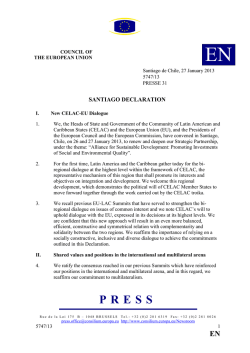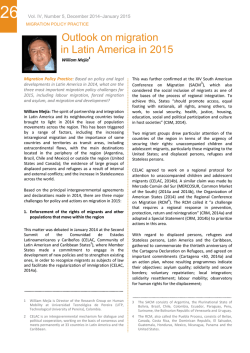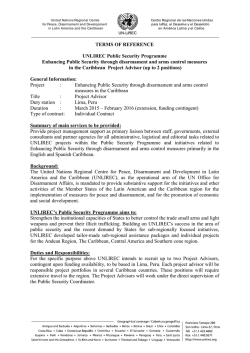
Speech by EU High Representative Federica Mogherini at the
Speech of the European Union High Representative and Vice President Federica Mogherini at the Community of Latin America and Caribbean States (CELAC) Summit on 28 January 2015 in San Jose, Costa Rica Sr. Presidente de la Republica de Costa Rica, Sres Presidentes y Cancilleres, Excelencias, distinguidos delegados de los paises membros de la CELAC, senoras y senores, es para mi un honor dirigere a esta Cumbre, en nombre de la Union Europea, en un ano particularmente importante para las relaciones entre la Union y America Latina y el Caribe. Es tambien un placer tener la opotunitad de encontrarme con todos ustedes, de muchos de lo cuales me considero amiga, cuando apenas vengo de asumir mis nuevas responsabilidades. Cuenten ustedes con mi amistad personal, mi dedicacion y compromiso para que nuestra cooperacio sea cada dia mas fuerte. Most of all, I want to thank you because in San Jose have the opportunity to assure Latin America, at the beginning of my mandate, on the renewed impetus that as EU we want to give to our relations. Strengthening our relation is a strategic priority. In a world where development and democracy are so threatened, we have to work on new perspectives for a space of peace and dialogue. Already for more than 15 years, the European Union and Latin America and the Caribbean have maintained a strategic bi-regional partnership. But the structured engagement of the EU in the region certainly predates the launching of this partnership in Rio in 1999. That engagement actually began right here, in Central America, in the 1980s. The San José dialogue of 1984 which lasted several years became a milestone in the EU's support to peace processes in the region. This reinforced other initiatives such as the Contadora group and the subsequent efforts led by President Oscar Arias, all of which greatly contributed to bringing peace to Central America. However, it is not the simple fact of being the longest standing international partner of the region that I want to highlight today. When addressing the wide range of current international affairs, and the pressing challenges that affect us all, from climate change to non-proliferation or countering terrorism, Europe and Latin America and the Caribbean appear as the two most like-minded regions in the world. This is the combination of our shared history, cultural affinity and strong social contacts, but also of our shared principles and values, and strong belief in effective multilateralism. However, we cannot take these for granted, our shared objective must be to translate our common values and principles into an example to bring about positive change around the world. While it is not possible to 'export' values, it is our duty, for all of us, to be consistent and coherent, so that we can truly be an example of freedom and democracy, Throughout the decades, our priorities have resembled and converged in the past and we need to make sure they will keep converging in the future. This is why I am pleased to note that one of the key themes of this Summit, the fight against poverty and the use of public funds with a particular attention to transparency, is also at the core of the EU's external action. We support these concepts in all our development cooperation initiatives around the world, convinced that development efforts can only take root within a framework of accountability and responsible action by public authorities towards their citizens. Moreover, we are all engaged in the definition of the post 2015 development agenda on the basis of sustainable development goals and the EU strongly believes that together with CELAC partners we can influence significantly the outcome of this process. A holistic framework based on poverty eradication, reduction and prevention of inequalities everywhere in the world, environmental and socio-economic sustainability and the principles of rule of law offers the best chance to promote the future we want. Climate change is the other global issue in which our good cooperation is essential. The EU is pleased with the results of COP 20 in Lima and is very grateful to Peru for the excellent preparation and management of the conference. Now, we have to concentrate our joint efforts towards a global legally binding agreement at COP 21 in Paris. At the EU we also follow with great interest what constitutes the second key theme of this Summit, the future evolution of CELAC. Throughout these years, the EU has been consistently supporting the regions’ integration process and upon its establishment in 2011, CELAC became our interlocutor within the bi-regional relationship. Taking into account the richness of our dialogues in many fields and the dense network of agreements at all levels, with most of your countries, I confidently believe that the EU is CELAC's most structured international partner. CELAC will always find the support of the EU. We see open regionalism as a stepping stone to a more effective global multilateralism. We see our partnership as one of equals, based on mutual respect, but we wish to have stronger relations with you in order to unlock the potential that our joint efforts can still bring - within our regions but also globally. The mutual benefits of our partnership are clearly manifested in bi-regional trade and investment. Over time, the EU has consolidated its position as the first foreign investor in the region, accounting for one third of the overall investment in the CELAC area. Figures speak for themselves: EU investments in Latin America and the Caribbean are greater than those we have in Russia, India and China combined. Most important, we believe that this economic activity has brought along important benefits to the region, and act as vehicle to further develop concepts such as corporate social responsibility, or environmental sustainability. However, the benefit is also reciprocal and we see with great enthusiasm the rise in recent years of investments from CELAC countries in the EU. We encourage very much these two way flows. Our reciprocal trade doubled in the last decade and the EU is CELAC's second trade partner. Certainly, the economic crisis hitting Europe caused the reduction of the EU imports from the CELAC region, but we are keen to increase trade by both developing the network of trade agreements and conducting concrete actions to support the business. There are many fields in which we can strengthen our cooperation: small and medium sized enterprises, security, the fight against poverty and social inequality. Alongside our strong political and economic relations, we have heard the demands for cooperation in areas such as technical innovation, education, economic diversification and environmental sustainability. We are already doing much together in these areas, but the EU is open to further develop joint cooperation. Moreover, as regards citizen security, the EU stands ready to work with our willing partners in Central America, where we once started, but also in the Caribbean and beyond. These are just some examples of fields in which we can cooperate more. Ladies and Gentlemen, Together, the EU and CELAC represent 61 States, about 1/3 of United Nations members. But we are much more than just the sum of our parts. The positive example of our partnership is very much needed in an ever-complicated world, in which some of the key principles of the international order are at stake. I do believe that the EU and Latin America and the Caribbean have the opportunity to continue deepening a constructive relationship based on common values and principles and a strong belief in effective multilateralism, of which we are part, and to positively influence the rest of the world by doing so. An important milestone in the calendar of both regions this year will be the next EU-CELAC Summit in Brussels, to which you are all invited. Two years after the Santiago Summit, there will be a lot to take stock of, but most important, it will be an opportunity to lay down the parameters of our bi-regional relations for the coming years and shaping our common future, in which we must ensure prosperous and sustainable societies to our citizens. In view of that, the EU relies a lot on the excellent cooperation with CELAC pro-tempore presidencies - currently Costa Rica whom we would like to thank and soon Ecuthank with whom We'll be happy to work - and its individual members to prepare our joint Summit and make a success of it. We attach high importance to the meeting and to the documents we will adopt, but, above all, we attach high importance to an open dialogue with you and to developing joint visions and actions on what I want to turn into a Partnership for the Next Generation. This Summit come in a time of change for the Region, with new perspectives in the Cuba-US relations, and for Europe. A new leadership has just started its mandate, and my presence here, in my first 100 days in office, is a concrete sign of how much we value our partnership and how much we are willing to take it to a further stage. As President Solis told me yesterday, the relations between EU and CELAC can't be only on trade and economy. We have to deepen our political dialogue, starting from a common vision and common roots. We can help the world to move from confrontation to cooperation and respect. I'll be happy to work together on this perspective in the coming years.
© Copyright 2026


